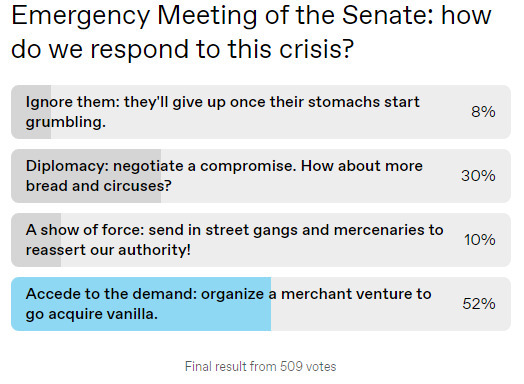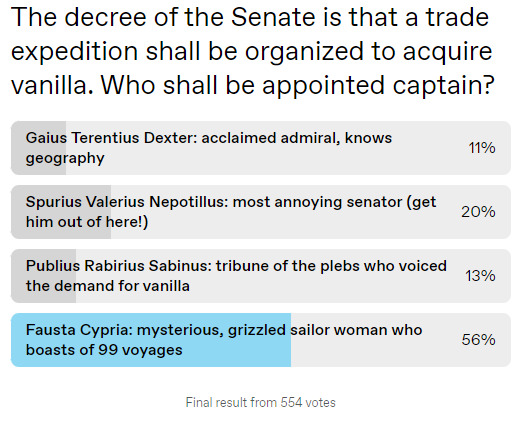#Values in Economics
Text
Moral Reflections on Economics, Vol 4, Issue 2
February 2024 issue of Moral Reflections on Economics is online. It features:
Article on Liquidity Risks in Islamic Banks by Salman Ahmed Shaikh
Highlights of Al Baraka Forum 2024 by Muhammad Hammad
IEP Public Poll results on Al Baraka Forum 2024
Book review of Economics of Prophet Muhammad (pbuh) by Syed Fazlur Rehman
Research paper in focus on Cash Waqf in Malaysia by Zaki Ahmad, Mushtaq…
View On WordPress
#Islamic Economics#Islamic Economics Project#Moral Reflections on Economics#Morality in Economics#Social Economics#Values in Economics
0 notes
Text
"Good heavens, potatoes are worth more than gold!"
"Surely not!"
"If you were shipwrecked on a desert island, what would you prefer, a bag of potatoes or a bag of gold?"
"Yes, but a desert island isn't Ankh-Morpork!"
"And that proves gold is only valuable because we agree it is, right? It's just a dream. But a potato is always worth a potato, anywhere. Add a knob of butter and a pinch of salt and you've got a meal, anywhere. Bury gold in the ground and you'll be worrying about thieves forever. Bury a potato and in due season you could be looking at a dividend of a thousand percent."
Terry Pratchett, Making Money
#moist von lipwig#sacharissa cripslock#making money#discworld#terry pratchett#money#economics#economic theory#wealth#potatoes#value#worth#relative value#currency#perception#psychology#a potato is always worth a potato#why is ankh-morpork like a desert island?
15K notes
·
View notes
Text
The “enormously powerful Atlas Network, a global network of more than 500 member think tanks advocating for “free market” policies.”
Started by Antony Fisher and his Institute of Economic Affairs in the UK. It went worldwide with assistance from the Koch family and Rupert Murdoch, along with funding from big oil companies.
☝️👏🤯
#institute of economic affairs#IEA#Atlas Network#Koch family foundations#Rupert Murdoch#big oil#climate denial#Antony fisher#republican hypocrisy#republican assholes#republican family values#republican values#oligarchs#global conspiracy#right wing politics#climate change#climate Justice#climate and environment#climate change denial
598 notes
·
View notes
Text
"The transition from [the barter system to currency] is hard to understand; how can human cravings be fetishized into pieces of metal? The answer is elegant because it reveals not only the origin of money, but its character even today. Money was and still is literally sacred: 'It has long been known that the first markets were sacred markets, the first banks were temples, the first to issue money were priests or priest-kings.' The first coins were minted and distributed by temples because they were medallions inscribed with the image of their god and embodying his protective power. Containing such manna, they were naturally in demand, not because you could buy things with them but vice-versa: since they were popular, you could exchange them for other things.
The consequence of this was that 'now the cosmic powers could be the property of everyman, without even the need to visit temples: you could now traffic in immortality in the marketplace.' This eventually led to the emergence of a new kind of person, 'who based the value of his life — and so of his immortality — on a new cosmology centered on coins.' A new meaning system arose, which our present economic system makes increasingly the meaning-system. 'Money becomes the distilled value of all existence ... a single immortality symbol, a ready way of relating the increase of oneself to all the important objects and events of one's world.'
If we replace 'immortality' with 'becoming real,' the point becomes Buddhist: beyond its usefulness as a medium of exchange, money has become modern humanity's most popular way of accumulating Being, of coping with our gnawing intuition that [the ego does] not really exist. Suspecting that the sense of self is a groundless construction, we went to temples and churches to ground ourselves in God; now we ground ourselves financially.
The problem is that the true meaning of this meaning-system is unconscious, which means, as usual, that we end up paying a heavy price for it. The value we place on money karmically rebounds back against us: the more we value it, the more we use it to evaluate ourselves."
- David Loy, from "Buddhism and Money: The Repression of Emptiness Today." Buddhist Ethics and Modern Society: An International Symposium, edited by Charles Wei-hsun Fu and Sandra A. Wawrytko, 1991.
#david loy#quote#quotations#anthropology#economics#symbols#money#psychology#psychoanalysis#buddhism#value#neoliberalism#capitalism
278 notes
·
View notes
Text
Me: positive responses to my school work? The hell?
Teacher: well, yeah, you did good-
Me: but this- I! Did this!
Teacher: yes. Well done
Me: holy shite! I did good? What if I do another task?
Teacher: awesome!!!!
Me:

I present to you: the mind boggling concept of getting praised for your accomplishments rather than punished for your mistakes.
I've been living off this experience for over 6 months.
#uni#personal#praise#it's like wtf#and yeah i know i get compliments in ao3 comments and under art posts#but there is a difference#i'm doing art and writing for fun and don't owe you anything#so critique would simply cause me to stop sharing stuff#so praise here as economical value#but my teachers have faces#and I am depending on their good will#there is a different power dynamic between us than between a writer and their voluntary comment section#though writing and your responses still do mean the world to me#i think you know what I mean
21 notes
·
View notes
Text
Ko-Fi prompt from KemiKitty:
id enjoy hearing about concerts and ticket money if you want
Referencing my “how does this make money/how does this lose money” in this post.
Whoo! I actually really enjoy talking about money flow like this. Digging into examples like this helps with understanding the interconnectedness of the economic systems we inhabit, and with why things cost What They Do.
Disclaimer: I have not worked in this industry. I just majored in business, watch a lot of documentaries/video essays, and like to break down business and economic topics. When I got to performances, I try to figure these things out as an observer (dinner theater from watching Lindsey Sterling before she got super famous, more Traditional concerts at Staller Performing Arts center, Broadway shows) and asking questions of tour guides when at places like the Vienna Opera House.
Our Example: A moderately popular performer, in an enclosed performance space with a stage, fixed seating, and food service.
Let us consider a performer of middling popularity. They go on tours, but only in the lower 48 states, not yet internationally. They do single nights at an independent venue, which has either dinner tables or rows of audience seating. Let's say... 350 seats, in a middle-sized city, with $30/ticket on average, with wiggle room depending on seating, VIP passes, and discounts (groupons, senior, military, annual passes, etc).
So, who is getting paid, and who is paying?
Money coming into the venue, tied directly to this one event:
Tickets
The people who came to this concert are paying for the tickets. 350 seats, at an average of $30/ticket, that's about $10,500. Most of this money does not go to the venue, but may pass through it, or leave a cut with it.
(Depends on the ticketing software; we're saying this is an independent venue, not part of the ticketmaster situation, so it's a maybe.)
Food and drink
The venue sells snacks, possibly full meals, if it's a dinner-and-show location. It may sell alcohol. It almost definitely sells drinks, maybe has vending machines if nothing else. If attendees cannot bring their own food and drink, and don't want to leave the building so they don't miss the show, then the venue can mark up the food they sell.
Merchandise
Dependent on the type of merch and the venue, this may be a flat fee, where the performer puts down a few hundred dollars up front to set up a table for after the concert, or it might be taking a small cut of whatever is sold that night. They might not charge anything, but we'll include it as a likely avenue of income. I can see some kinder venues waiving the fee for newer, up-and-coming artists, but generally you can assume that the venue will take a cut.
Money flowing out of the venue, tied directly to this one event:
The Performer and their team
The ticket costs will go primarily to the performer, their backup dancers/singers/band, their manager, and whatever fund they have for things other than wages, like a tour bus rental fee, the label, the driver, the night's post-concert laundry costs, and so on.
The chances of all that money going to a single performer is very low; you can generally assume they have backup, management, additional costs, and someone pulling the strings. There are exceptions, like unaffiliated stand-up comedians or other, genuinely solo acts, but for the type of event I'm outlining, these are all contributing factors.
Performers may bring their own lighting/sound techs. The venue also might provide their own. For a larger venue, I'd assume both are involved; one who knows the concert's program, and one who knows the venue's setup.
Venue staff
The ushers, lighting/sound technicians, the bar staff, the cook, the janitor, security, and anyone else who is working night-of is getting paid. We can equate their pay to the money coming in from specifically the food and drink sales, along with tips for the waitstaff in particular.
By this, I mean that the correlation is such that, should sales fall, the corresponding cut in costs is employee labor (the bar staff and cooks), rather than the performers (whose costs are calculated in relation to the money they bring in relating to the ticket sales).
Food and Drink
Raw ingredients for the food, wholesale costs for the liquor, napkins, single-use straws, and so on.
Printed Programs
Someone has to print the little booklet that tells you who's performing tonight, who's performing for the next few months, and anything else you need to know. If it's a big-name cultural center, they may even include some interviews! But ink is expensive, and that's a lot of paper.
Money coming into the venue, not connected to the specific event:
Advertising
Does the venue have posters around for local businesses? For insurance companies? For upcoming events? Someone is paying them for that.
Does the venue intersperse the pre-show music over the speakers with the occasional ad spot? Someone is paying them for that.
Does the venue have ads in the program booklet? Someone is paying them for that.
For a really, really large venue, the kind with dozens or hundreds of employees and massive lighting/sound setups, they are liable to get most of their income from advertising.
Government Grants and Private Donations
Depending on the venue, they may donations or grants. This is more likely to apply to a university/community performing arts center than a for-profit dinner theater, but it's a possibility.
Merchandise
The venue may have merch that is unrelated to the performance of the night. A historic or novelty location is most likely to have success with this, selling beer glasses with their logo or a t-shirt with 'home of the [band from several decades ago]' printed across the front.
Money flowing out of the venue, not connected to the specific event:
Administrative/Overhead Employees
Management, bookkeeping, legal, marketing, and so on.
Utilities
Electricity, water, sewage, gas, telecomm, and so on.
Taxes, Licenses, Fees
Sales tax, property tax, liquor license, etc.
Mortgage or lease
The venue's business owner is not necessarily the one to own the property outright. They may pay rent to a property owner, or mortgage to the bank.
Maintenance - Building Codes
Any large building is going to need plumbers, glass techs, electricians, roofers, and so on coming by with regularity.
(This part, I actually do know; I used to do repairs dispatching, and you'd be amazed how frequently a big box store needs someone to come by about the toilets.)
Maintenance - Venue Codes
There are certain things that an entertainment venue needs to do that other businesses... don't. Namely, fire safety. It's a huge deal.
Staying up to code can be expensive, especially if you need to get your backstage/wing curtains chemically treated again, which can be anywhere from one to five years, or the next time someone spills water on it. (That's the main reason open containers of liquids aren't allowed backstage.)
Marketing
Just like people pay the venue to advertise, the venue pays for others to advertise it. This could be in the local newspaper or online, but if a given performer isn't someone semi-famous on tour that has a following, then something else needs to draw in a regular paying crowd.
Miscellaneous Overhead
There is a lot of overhead for any business of moderate size that has its costs spread out over the year. This includes hiring an accountant for tax season, purchasing uniforms for employees, replacing cutlery and plates and furniture as it wears out or gets lost, repainting the walls every few years, office supplies when the printer for the programs wears out, and so on.
Is this everything? Almost definitely not.
But, hopefully, I've untangled a few things that you may not have considered before.
Those tickets and drinks you bought cover a lot more than just the performer!
...unless it's through ticketmaster, in which case it's probably just the monopoly.
----
If you enjoyed this post, please support me on ko-fi! You can also prompt me for a business/econ topic of your choice here.
#business#budgeting#accounting#phoenix posts#ko fi#ko fi prompts#economics prompts#theater fires#are a big deal#this is what accountants do btw. they track all of this plus less concrete stuff like depreciating value or deferred costs
68 notes
·
View notes
Text
The Vanilla Expedition (Part IV)



#the vanilla expedition#I restricted this list to trade goods with relatively high ratios of economic value to volume#to avoid wasting limited cargo space on stuff that isn't very valuable#but ultimately the sale value of these goods will depend on where you go looking for vanilla...#...hopefully in the correct direction!#but that will be the next poll :)
117 notes
·
View notes
Text
the world will be like yeah kid youre adopted and now you just have to put up with a whole lifes worth of complicated feelings on your self worth and your family and dont even get me Started on how it feels watching non adoptees praise adoption like its the perfect solution to every problem. like man okay. thanks i guess. can i get a smoothie with all of that
#sorry having a Day#but hey#i can make jokes about my economical value#since i found out what my adoption fee was
11 notes
·
View notes
Text
i keep dismissing societal concepts i think are silly in my head and so i go around being like we made this up it's so pointless... abt like copyright law or whatever but then i kind of lock myself in an echo chamber of my own brain where i go around thinking stuff and then i have a conversation with a friend where i find out they put weight in [concept] i've dismissed like they're talking about how IQ is real and measurable and important for statistics and im like WHAT THE HELL...
#ive gotta talk to people more i did learn from that conversation a little bit#i think we had fundamentally different points that were flying past each other like they were saying iq is real and it's valuable for#statistics bc it's something that u can take over and over at different times and get the same result and therefore it can be solidly#extrapolated for different demographics and then that can be attributed to different things like chemical spills or economic inequality or#whatever and i wasn't saying that wasn't true but i was more arguing that it's silly the weight people give it outside of a metric of#statistics like the way people who i've talked to give value to it in real life is stupid bc i've talked to several people who have been#like oh you're so smart that makes me feel bad and im like it means nothing its just a percentage on a test everyone has different#aptitudes for things and that's what's meaningful out in the real world barring its usefulness in statistics#i also wasn't good at explaining myself i didn't really say what i said above i said like half of it poorly#alex talks
8 notes
·
View notes
Text
Ever think about how weird it is that we've sort of collectively agreed games devalue over time?
This is one of those subjects where I just know people are going to start reading this and think I have some sort of weird vested interest in the price of some particular game or the profits of some publisher or whatever, so let me just get right out front here and say no, this really is me just waxing philosophic in a vacuum.
You like movies? You like actually owning copies of movies? Right now, taking a look around, it seems like if you want to buy a movie on bluray, that costs you about $25. Maybe more like $30 if it's some big fancy release with a lot of pack-in material, like the Criterion Collection stuff, but basically you're looking at $25. You like music, want to buy a new album? On CD, that's going to cost you $15. Or at the point we're currently at where there's this odd revival of vinyl records, you're looking at maybe double that? Little harder for me to work out the basic going rate since I think we're at a point where people are doing limited printings and stuff isn't going to stay at the sticker price long, but there's SOME pretty consistent price point everyone goes with, I'm pretty sure. Books? $20 hardcover, maybe half that for a paperback. You want to buy a video game that just came out though? Well, if it's new-new, and this is the first time it's ever been made available, that'll be about $60. If it's a rerelease though? You damn well better not ask for more than $5 for that or people are going to be furious. And that's super weird!
I've tried discussing with people just how weird this is, and it doesn't really seem to properly register with anyone. One big hangup is that (and this may be because the target audience for games skews really young and the industry has been really pushing to obliterate the concept of owning a game for like a decade or two) is that the people I'm talking to are completely conflating the concept of the work and the publication of a work. Like, yeah, if a store orders a stock of 50 copies of something, and it doesn't end up selling all that well, then yes they are eventually going to mark down the ones that don't sell or toss them into a bargain bin or whatever. That's true for everything, but that is also not at all what we are talking about here. This is specifically about the actual suggested retail price on the package when it leaves the manufacturer. When I'm saying "a movie on bluray costs $25" that's true for a movie that is only just being released on home video for the first time after premiering in theaters two months ago, but that is also true for a movie from like the 1980s that someone's only just now getting around to putting out on the format, or they just got the rights to distribute in a given country (and yeah yeah, super America-centric numbers I'm using here, I know), or it came out like 4 years ago but there's a sequel out soon so we want to make it available again. Doesn't matter how old it is. We're selling it now, we're selling it for $25. It does not work this way for video games. If I port some game from the mid-'80s to whatever hardware is current, and I try to charge the standard price of a game for it, people would be outraged. I can charge $5 or I can bundle it together with a dozen other games and MAYBE get away with that. But I better be throwing in some extras, or make it like 30 games or whatever.
The next thing I hear people say is "well no, see, because with games, budgets for graphics keep going way way up! And you know, hey, that's why the average price of a game keeps going up! Hell games on the PS5 are like, $70!" and... OK so nothing about this argument has any basis in reality, at all. Games for whatever weird reason have always been just kind of immune to inflation. Like, in the 80s a videogame would typically cost about $50, and $50 in 1980 is about $200 adjusted for inflation. That number basically has not budged. Didn't come down when actual production costs dropped to practically nothing, didn't shoot up when budgets kinda ballooned either. You do sometimes see people make "budget games" for maybe half the typical price, but that's kind of just a marketing decision when you're going to release something you know critics are immediately going to pounce on for "looking cheap" or being shallow or whatever. By and large, whether a game is churned out really quickly on the cheap or has some bloated budget in the hundreds of millions, it's getting sold for that same $60. Movies work the same way. The movie that cost $400,000,000 to shoot and the movie that cost $35,000 to shoot both cost you $25 to pick up a copy of at a store... and they also cost a bit under half of a what a game typically costs despite the fact that that they cost roughly twice as much to make (the math is kinda fuzzy, but that seems roughly true for the record-setters and the median, at least for big budget major studio stuff). Capitalism is weird like that, basically no connection between cost and price.
Those are honestly the two main points I see people toss out, at least out loud and in public. The next logical thing to assume though is that there have been profound qualitative gains in the field of video games across the board over the years. That they just keep getting better and better and better. And like, hell no to that. I will grant you that early on in the history of the medium, like, late 1970s to mid-80s, where we went from kinda basic arcade games where you've got maybe 2 minutes worth of game play and then you loop it at a higher speed, then this flurry of new technology and priorities and emerging concepts, and if you want to make a lesser value case against the former there, there's a case you could maybe argue. But you can't look me in the eye and sincerely tell me you'd rather play the worst game released this year than the best game from 30 years ago... actually holy crap there's a bunch of absolute gems turning 30 this year, look at this random wad of search results you know I didn't cherry pick because Earthworm Jim's in here:

Point is, yeah, video games are relatively young as an art form but not so much so that we don't have some immaculate classics older than half the people reading this. And again, hey, movies that predate any modern understanding of direction or editing, shot on cameras too old to record sound or color, and where all existing copies are pretty heavily degraded still get reissued at the same sticker price as anything else. Classic albums that were terribly mastered still sell for the same as stuff recorded on bleeding edge gear.
Oh and just to cover all my bases on this, I was tempted to bring up paintings and how with those the oldest works, especially anything where the artist is no longer with us, shoot way up in value, but that's not really fair to bring up since there we're talking about unique original one-off works, not mass-media. There was never a time when we could all go to the mall and pick up van Gogh's The Starry Night. Unless you just want a nice reproduction print. In which case that'll be like $20 (which when you think about it is an outrageous markup for a single frame of video).
Finally though, we have that argument I alluded to that I'm pretty sure IS a lot of people's logic on this which they probably aren't saying out loud, or maybe even consciously thinking to themselves- The older a game is, the easier it is to emulate. If I'm really jonesing to play the original Castlevania right this minute, it's gonna take me like 10 seconds to type a search query, grab a zip file that's all of 65k, unpack it, maybe spend another 10 or 20 seconds double checking what emulator people recommend these days, and I'm good. Maybe even less, I'm sure there's some site I could find quicker than that just emulating it with HTML4 or something right in my browser. But if I want to play like, Wild ARMs 3, I'm grabbing a bigger file, I don't know if there's any good PC emulation of the PS2 these days, I might need to get into the MiSTer scene, or work out how to make my actual PS2 read a burned DVD (in this weird hypothetical scenario where I don't have the actual game on a shelf in my eye-line and I don't have to dust off a computer old enough to still have a DVD-burner standard issue) anyway). And if I want to play, uh... what's current and doesn't have a PC release? And isn't on the Switch which has weirdly good emulation for a current system. That new Ratchet & Clank game? I assume I'd need to do some serious research, have a much fancier computer, seems like a huge game.
But you know, if even on a subconscious level, that means you inherently consider those earlier games to be less valuable (and hell, now that I think about it, I think I actually HAVE seen people openly make the argument that cartridge-based games have literally no intrinsic value because it's so easy to just emulate them), then... you're kind of a total piece of garbage and invalidating any sort of morally defensible stance you might have on piracy and emulation? Like you want to talk to me about preservation or ease of access or outright refusing to financially support whatever company would profit off a particular purchase, those are all pretty defensible positions, but you try and tell me art only has value when there is no easy way for you to personally enjoy it that doesn't involve cutting a check to someone, I think I might actually hate you and everything you represent? Or at the very least I'd like for you to really take a moment to reflect on your principles and reevaluate some things.
And again, that final little thought on this subject in particular strikes me as something people can take in a particularly inflammatory way, so let me just again reassure you I have no issue with anyone's habits regarding piracy or emulation or whatever. I'm coming at this whole subject purely as a sort of philosophical question/exploration of the commodification of art and artists/anticapitalist sort of thing.
And yeah, to just articulate that last point a bit more, while I totally think it's the weirdest thing that the public consensus is that games inherently plummet in value over time, I feel like we got here thanks to a series of very conscious decisions from scumbags in boardrooms. People want you to give them all your money and ideally avoid giving you anything in return. Their whole deal works best when they can convince you that whatever it is they have to sell you right this minute is the most valuable thing in the world and you need to have it right now, and whatever they sold you yesterday is actually total garbage with no value and you know you should really just toss it in a dumpster and make sure you have the room for today's new thing.
Hell, this is getting a bit out of scope, but marketing people are actually really working hard these days to build up an association between how much space a game takes up on your hard drive being a direct reflection of the game's value, and people are shipping games with intentional bloat like ultra-high-resolution assets and needlessly uncompressed files, because if you can only fit like 3 games on your drive, hey, buying this new game means tossing a ton of stuff out. Less stuff for you to play and be content with, less options for what game you're just going to log into every day and have people sell you DLC, and by the time they have a new game to sell, you're going to have to throw this one out to make room for that. No deep libraries, just the current thing.
So, yeah, on the one hand we have companies asking you to buy the same games now you already bought a while ago, and screw them for that, but they're also trying to convince you that nothing you own has value or deserves preserving to always keep you hungering for something new, and WOW screw that so much. Art has value, it retains that value, it's good to build up libraries and share them and keep stuff in circulation for new audiences to discover and people to revisit and re-examine. So quit letting anyone try to convince you old games (or old art of any other kind) has no value. And if you can be bothered, hey, do your best to support artists as much as you can and creeps trying to commodify art as disposable product as little as you can.
#video games#economics#capitalism#artistic value#retro gaming#retro games#you know come to think I think I got onto this just talking about how indie developers should decide what to charge for their stuff somehow
6 notes
·
View notes
Text
“It is Capitalism that has forced a moral feud and a commercial competition between the sexes; that has destroyed the influence of the parent in favor of the influence of the employer; that has driven men from their homes to look for jobs; that has forced them to live near their factories or their firms instead of near their families; and, above all, that has encouraged for commercial reasons, a parade of publicity and garish novelty, which is in its nature the death of all that was called dignity and modesty by our mothers and fathers.”-G.K. Chesterton
#christianity#catholic#catholicism#gk chesterton#he's basically saying modern economics have made everything into a pointless dick measuring contest#at the expense of dignity and moral values#almost deliberately so#distributism#capitalism
6 notes
·
View notes
Text
Tragedy of the Lands
The Tragedy of the Commons is an economic metaphor stating that publicly held land is doomed to be destroyed from over-exploitation as everyone will try to maximize their return on it. Regardless of its merit, the inverse seems to be happening with climate change right now. We have several large competitors, corporations and nations, destroying the ability to live on Earth. If one stops, it will cause their suffering, while still dooming us. Only if we all stop will we confidently be able to slow or prevent our demise. Instead of the resolution of individual held land used to prevent destruction, it could be seen our lack of publicly held land that is endangering us. Now, it could be seen that if it was publicly held, no one would be interested enough to stop it the same. But given the problems that have shown with individual held land, at best, they are equally insufficient to prevent mass destruction.
#self#quote#philosophy#climate change#economics#values#thoughts#morality#ethics#wealth#greed#competition#life#society#politics#political#science#destruction#perspective#metaphorical#writing
4 notes
·
View notes
Text


can’t believe there are ppl who are selling these holiday broadcast pcs that they got for free for hundreds of dollars 😠
#not calling them moas bc why would a moa do that!!!#i saw screenshots of ppl selling sets for $800!!!!#or selling ONE pc for $70 😭#WHY WOULD YOU SELL THEM 😭😭😭#if i got these for free i’m keeping them forever 🥺#or if i decide to part ways with them for whatever reason i’ll just give them away to another MOA who would value it too!!#the economics of kpop (photocards) really astounds me sometimes…#rambles#tomorrow x together
4 notes
·
View notes
Text
This may be a little topical but watching a[nother] doc on SBF and the collapse of FTX really twists up the rhetorical angle of "effective altruism" brought up in POF.
Like. That collapse was kind of doomed to happen given how actually idealistic/naive some of the starting assumptions for EA are. One of which is not asking what forces even makes charity a "necessity" to speak of - wealth hoarding.
In order to get filthy stinking rich to "give back even more" you will fall into capitalism's traps. You will become the monster that makes people go to bread lines. You will have to fall into the trap of endless profits - and becoming more and more miserly when it comes to reporting to your investors and to the government.
Because to those investors? They couldn't give less of a shit how much you spend on "philanthropy" as long as you show infinite growth. It's why mass lay-offs can STILL happen during a GOOD quarter or product release. It's why rich philanthropy is pocket change compared to if said rich people didn't wriggle themselves outta paying taxes.
Taxes that fund social security, welfare programs, education, infrastructure, etc. Things that actually help people.
What I'm saying is - I think Janus (and Logan?) was definitely playing into some pro-capitalist rhetoric here. Which, I think should be more taken as a dialectic. Janus is known to discard inconvenient facts to make his arguments... but I do think his greatest value is to simply make one think about stuff more critically/comprehensively. Offering more questions to ask.
Neither Janus nor Patton has ALL the answers in the topic of ethics/morality. One can take/leave what works from their discussion as one sees fit. This is just me rambling/reflecting on it.
#sanders sides#janus sanders#patton sanders#logan sanders#(... i fully recognize my... biases here)#(but EA really is dependent on the notion that rich people will give back in any meaningful proportion)#(and that frankly has /never/ bore out in reality - under enough scrutiny)#(EA has some value when applied into personal life - but w/ heavy nuance/caveats applied)#(this aint a jan hate post - i don't hate any of the sides... just something that settles strangely/fascinatingly)#(frankly the SBF/FTX/AR mess is a good case study on the limitations of EA)#(mod post)#economics/
5 notes
·
View notes
Text

The thing about this type of argument that always gets me is the accusation of jealousy. It's projection.
I don't want $200 million. I don't think anyone should have that much money. If I somehow came into that amount of money, I would want to give most of it to causes that I care about like domestic violence shelters or feeding the hungry and make sure my nieces and nephews have secure futures.
Some people seemingly cannot fathom that other people do not see wealth accrual as a worthwhile--or even moral--life goal.
#politics#us politics#progressive#economics#capitalism#anti capitalism#wealth#wealth inequality#eat the rich#values#greed#life goals
5 notes
·
View notes
Text
The more I hear from our new government the more I want to move out of Finland.
This is a fucking shitfest yall.
So, how's being a freelancer/entrepreneuer in your country? What are the required languages?
Asking for fun.
#ramblings#our new ministry of economics doesn’t understand value added tax#state support for the less wealthy sick and students is gonna get cut#they want to remove tuition grants from adults who already have an education/job#and they want to remove the employee sabbatical#in other words i have no hopes of getting a new degree#might as well go swimming with a fucking rock#mum asked me if i see anything positive ahead and no i do not#shit is already miserable#i don't want it to get worse
7 notes
·
View notes